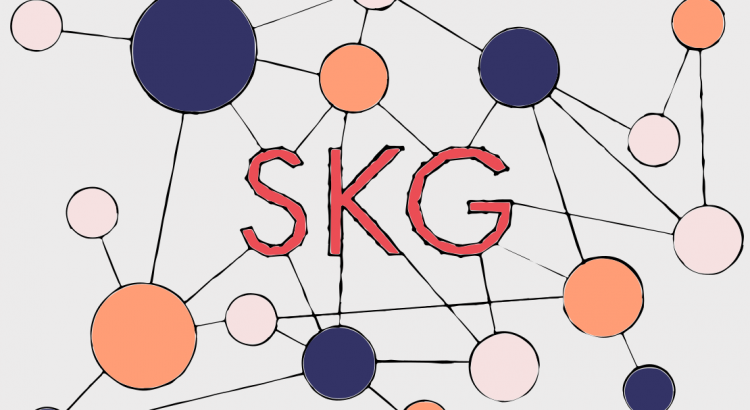web: https://skg.kmi.open.ac.uk, twitter: @skgworkshop
Held in conjunction with TPDL2020, 25th-28th August 2020, Lyon, France
Overview
In the last decade, we experienced an urgent need for a flexible, context-sensitive, fine-grained, and machine-actionable representation of scholarly knowledge and corresponding infrastructures for knowledge curation, publishing and processing. Such technical infrastructures are becoming increasingly popular in representing scholarly knowledge as structured, interlinked, and semantically rich Scientific Knowledge Graphs (SKG). Knowledge graphs are large networks of entities and relationships, usually expressed in W3C standards such as OWL and RDF. SKGs focus on the scholarly domain and describe the actors (e.g., authors, organizations), the documents (e.g., publications, patents), and the research knowledge (e.g., research topics, tasks, technologies) in this space as well as their reciprocal relationships. These resources provide substantial benefits to researchers, companies, and policymakers by powering several data-driven services for navigating, analysing, and making sense of research dynamics. Some examples include Microsoft Academic Graph (MAG), Open Academic Graph (combining MAG and AMiner), ScholarlyData, PID Graph, Open Research Knowledge Graph, OpenCitations, and OpenAIRE research graph. Current challenges in this area include: i) the design of ontologies able to conceptualise scholarly knowledge, ii) (semi-)automatic extraction of entities and concepts, integration of information from heterogeneous sources, identification of duplicates, finding connections between entities, and iii) the development of new services using this data, that allow to explore this information, measure research impact and accelerate science.
This workshop aims at bringing together researchers and practitioners from different fields (including, but not limited to, Digital Libraries, Information Extraction, Machine Learning, Semantic Web, Knowledge Engineering, Natural Language Processing, Scholarly Communication, and Bibliometrics) in order to explore innovative solutions and ideas for the production and consumption of Scientific Knowledge Graphs (SKGs).
Topics
We encourage the submission of papers covering, but not limited to, one or more of the following topics:
- Methods for extracting entities (methods, research topics, technologies, tasks, materials, metrics, research contributions) and relationships from research publications
- Methods for extracting metadata about authors, documents, datasets, grants, affiliations and others.
- Data models (e.g., ontologies, vocabularies, schemas) for the description of scholarly data and the linking between scholarly data/software and academic papers that report or cite them
- Description of citations for scholarly articles, data and software and their interrelationships
- Applications for the (semi-)automatic annotation of scholarly papers
- Theoretical models describing the rhetorical and argumentative structure of scholarly papers and their application in practice
- Methods for quality assessment of scientific knowledge graphs
- Description and use of provenance information of scholarly data
- Methods for the exploration, retrieval and visualization of scientific knowledge graphs
- Pattern discovery of scholarly data
- Scientific claims identification from textual contents
- Automatic or semi-automatic approaches to making sense of research dynamics
- Content- and data-based analysis on scholarly papers
- Automatic semantic enhancement of existing scholarly libraries and papers
- Reconstruction, forecasting and monitoring of scholarly data
- Novel user interfaces for interaction with paper, metadata, content, software and data
- Visualisation of related papers or data according to multiple dimensions (semantic similarity of abstracts, keywords, etc.)
- Applications for making sense of scholarly data
Submission
Submissions are welcome in the following categories:
- Full papers presenting original work (12 pages incl. references, LNCS format)
- Short papers presenting original work (6 pages incl. references, LNCS format)
Papers can be submitted via EasyChair: https://easychair.org/conferences/?conf=skg2020
Submissions will be evaluated based on originality, significance, technical soundness and clarity.
Accepted papers (after blind review of at least 3 experts) will be published in the Springer CCIS series. The best paper (according to the reviewers’ rate) will be invited to a special issue of the journal Quantitative Science Studies (MIT Press)
At least one of the authors of the accepted papers must register for the workshop to be included in the workshop proceedings.
Important Dates
Paper submission: April 30, 2020
Notification of acceptance: May 22, 2020
Camera-ready due: June 5, 2020
Workshop day: August 25, 2020
Author instructions
All paper submissions have to be in English and submitted as a PDF file. Authors should consult Springer’s authors’ guidelines and use their proceedings templates, either for LaTeX or Word, for the preparation of their papers. Springer encourages authors to include their ORCIDs in their papers.
In addition, the corresponding author of each paper, acting on behalf of all the authors of that paper, must complete and sign a Consent-to-Publish form. The corresponding author signing the copyright form should match the corresponding author marked on the paper. Once the files have been sent to Springer, changes relating to the authorship of the papers cannot be made.
Note that the paper size limit must be respected. Camera-ready papers that do not comply with the page limit when formatted using the LNCS style may be rejected.
Organisation
Andrea Mannocci, Italian Research Council (CNR), Pisa (IT)
Francesco Osborne, The Open University, Milton Keynes (UK)
Angelo Salatino, The Open University, Milton Keynes (UK)
More information about SKG2020 is available at https://skg.kmi.open.ac.uk
Contact: [email protected]



